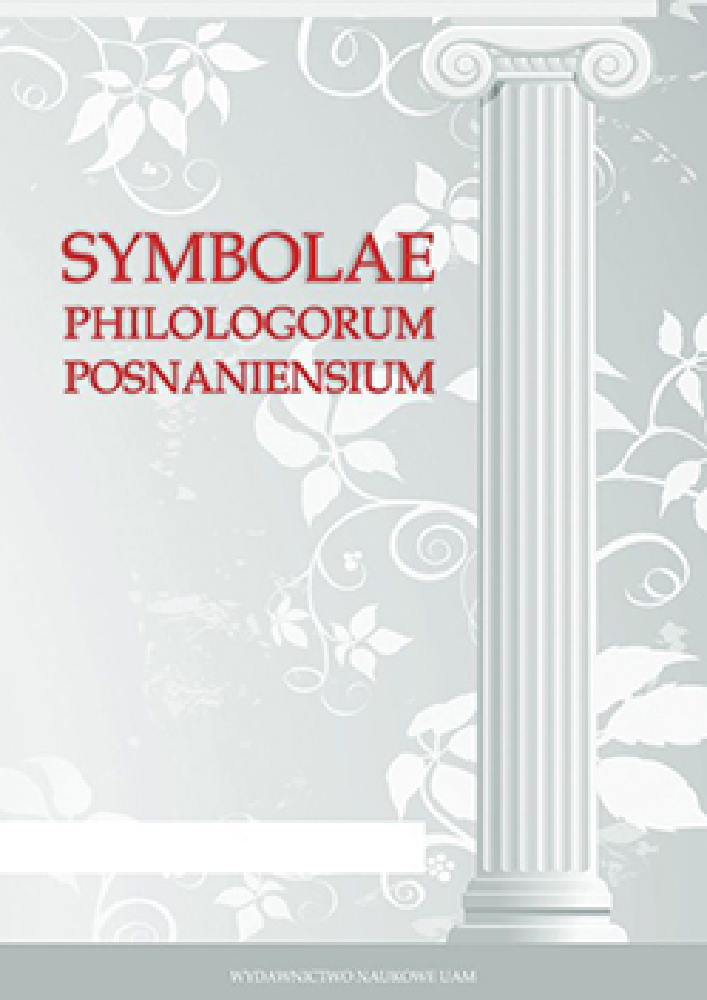Abstrakt
Aside from its wealth of meaning and contexts, Ovid’s poetry seems to be sometimes difficult to translate into Polish. This paper shows such an extreme situation using the example of Ex P IV 12, where the translator is virtually helpless in the face of the poet’s subtle sense of humor and sophisticated play with a reader on the grounds of the nature of Roman elegiac distich.
Bibliografia
Ovid, Heroidas, texto revisado y traducido por F. Moya del Baño, Madrid 1986.
P. Ovidii Nasonis Metamorphoses, ed. W.S. Anderson, Leipzig 1988.
Ovid, Tristia, Epistulae ex Ponto, with an English translation by A.L. Wheeler, Cambridge, MA, London 1996.
Owidiusz, Heroidy, przekład, wstęp i opracowanie M. Miazek-Męczyńska, E. Wesołowska, Kraków 2022.
Rzymska elegia miłosna (wybór), tłum. A. Świderkówna, oprac. G. Przychocki, W. Strzelecki, Wrocław 1955.
Ahl 1985: F. Ahl, Metamorfations. Soundplay and Wordplay in Ovid and Other Classical Poets, Ithaca and London 1985.
Barańczak 1994: S. Barańczak, Ocalone w tłumaczeniu. Szkice o warsztacie tłumacza poezji z dołączeniem małej antologii przekładów, Poznań 1994.
Battistella 2010: C. Battistella, P. Ovidii Nasonis „Heroidum Epistulae” 10: Ariadne Theseo, Introduzione, testo e commento. Texte und Kommentar, Bd 35, Berlin–New York 2010. DOI https://doi.org/10.1515/9783110240863 DOI: https://doi.org/10.1515/9783110240863
Buttler 2001: W. Buttler, Polski dowcip językowy, Warszawa 2001.
Camps 1954: W.A. Camps, Critical Notes on Some Passages in Ovid, „The Classical Review”, 4/3/4 (1954), 203–207. DOI https://doi.org/10.1017/S0009840X00180606 DOI: https://doi.org/10.1017/S0009840X00180606
Coleman 2010: K.M. Coleman, Cacemphaton in the Labyrinth: Ovid, “Heroides” 10, 71, „Mnemosyne” Fourth Series, 63/2 (2010), 280–286. DOI https://doi.org/10.1163/156852510X456552 DOI: https://doi.org/10.1163/156852510X456552
Danielewicz 2020: J. Danielewicz, Rates/rates: another gamma-telestich in Ovid’s „Ars amatoria” or an acrogram among anagrams, „Eos” 107 (2020), 59–64.
Gibka, Rutkowski 2015: M. Gibka, M. Rutkowski, Funkcja humorystyczna nazw osobowych w oryginale i przekładzie „Feet of Clay” („Na glinianych nogach”) Terry’ego Pratchetta, w: Funkcje nazw własnych w kulturze i komunikacji, red. I. Sarnowska-Giefing, M. Balowski,
M. Graf, Poznań 2015, 181–193.
Kassel 1975: Kassel, Quod versu dicere non est, „Zeitschrift für Papirologie und Epigrafik” 19 (1975), 211–218.
Kulawik 1990: A. Kulawik, Poetyka. Wstęp do teorii dzieła literackiego, Warszawa 1990.
Oliveira 2022: A. de Oliveira Fonesca Junior, A Name without a Body: Ovid’s Tristia 3.4a, „Classica” 35/1 (2022), 1–12.
Puk 2002: M. Puk, Epistolograficzny charakter niektórych elegii spośród „Żalów”, „Symbolae Philologorum Posnaniensium Graecae et Latinae” XIV (2002), 79–91.
Skwara 2008: E. Skwara, Plautus’ Puns and Their Translation, w: Studies in Ancient Theory and Criticism, essays edited by J. Styka, „Classica Cracoviensia” V, Kraków 2008, 183–192.
Skwara 2021: E. Skwara, Tłumacz – uczony. Oblicza przykładów literatury antycznej w XXI wieku, „Symbolae Philologorum Posnaniensium Graecae et Latinae” XXXI/1 (2021), 235–248. DOI https://doi.org/10.14746/sppgl.2021.XXXI.1.17 DOI: https://doi.org/10.14746/sppgl.2021.XXXI.1.17
[https://www.poetryintranslation.com/PITBR/Latin/OvidExPontoBkFour.php]
Licencja
Prawa autorskie (c) 2022 Elżbieta Wesołowska

Utwór dostępny jest na licencji Creative Commons Uznanie autorstwa 4.0 Międzynarodowe.

